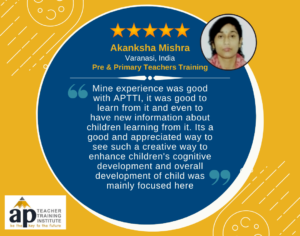Pre-Primary Teacher Training Essentials
The Vital Role of Pre-Primary Teachers In Pre-Primary Teacher Training
It’s both fun and hard for teachers to find their way around the bright world of pre-primary education. As they try to shape the thoughts of young students, pre-primary teachers face many problems that can get in the way of good teaching and learning. In this blog post, we look at the main problems that pre-primary teachers face and how specialized pre-primary teacher training can help them get past them.
Balancing Pedagogy and Play: The Struggle for Effective Teaching Methods
Finding the right mix between structured lessons and child-led play is one of the hardest things for pre-primary teachers. Teachers learn how to make a program that includes both of these things smoothly in a Pre-Primary Teacher Training Course. The value of creating an engaging learning environment where play is not only fun but also educational is frequently emphasized in Online Teacher Training programs.
Meeting Individual Needs: Addressing Diverse Learning Styles In Pre-Primary Teacher Training
Each child learns at a different pace and in a different way. Pre-primary teachers have to deal with the difficult task of meeting the needs of a wide range of students in the same school. Differentiated instruction techniques are taught in more detail in specialized teacher training courses. These classes give teachers the skills to find out how each child learns best and help them, so that no child falls behind.
Navigating Behavioral Challenges: Strategies for Classroom Management
It can be hard to keep track of a classroom full of active young students. Pre-primary teachers often have to deal with behavior problems like kids who are trying to get attention or kids who are fighting with each other. Courses on effective classroom control techniques are available from a reputable Teacher Training Institute. Teachers learn how to make a safe and supportive learning space for all children by using techniques like positive feedback and conflict resolution.
Partnering with Parents: Building Strong Home-School Connections
In a child’s early years, it’s very important for teachers and parents to work together. However, it can be hard for pre-primary teachers to start and keep up good contact with parents. In teacher training classes, it is stressed how important it is to have strong partnerships between parents and schools. Teachers learn how to keep lines of communication open, get parents involved in their child’s learning, and set up a support system that works for the child’s overall growth through workshops and exercises.
Continuous Growth: Embracing Lifelong Learning through Professional Development
In the fast-paced area of education, you need to keep learning to advance your career. To stay up to date on the latest research and best practices, pre-primary teachers need to be able to receive ongoing training and professional development opportunities. Teachers can improve their skills and knowledge while still juggling their other responsibilities by taking online teacher training courses. By putting money into their own growth, pre-primary teachers can deal with problems better and give young children more enjoyable learning experiences.
In conclusion, teaching pre-primary kids has its challenges, but teachers need specialized training to give them the skills and knowledge they need to deal with them successfully. A holistic strategy that includes pedagogy, play, and individualized support can help pre-primary teachers make safe places where all children can thrive. Not only do Pre-Primary Teacher Training Courses help the teachers who take them, but they also improve the level of early childhood education as a whole.






